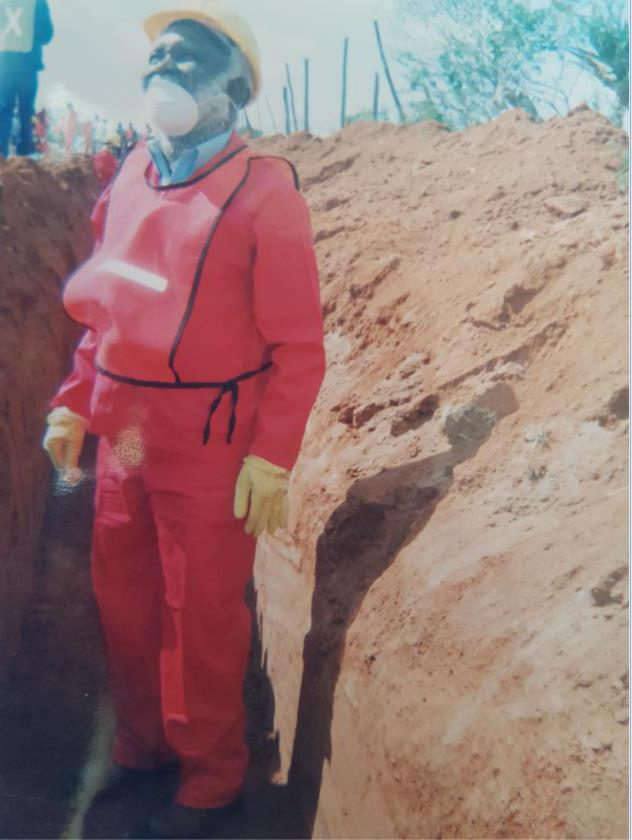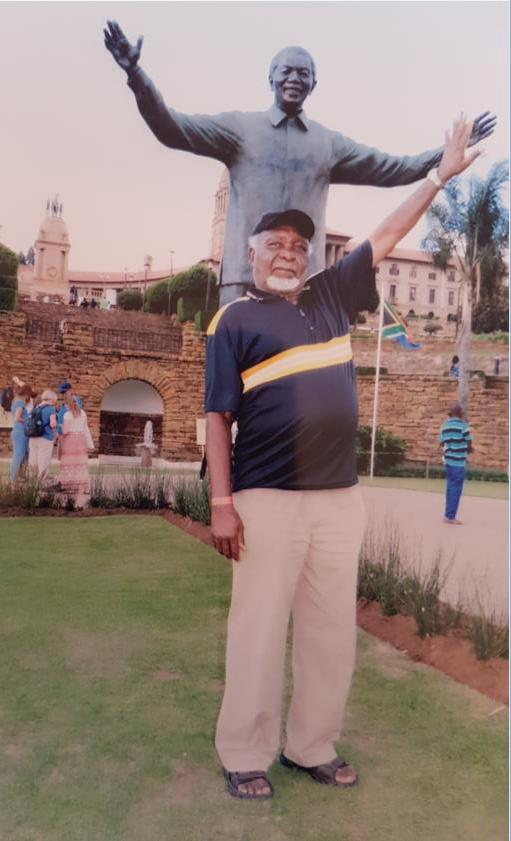Thoko Phillip Mamagobo, popularly known as ‘Thoko’, was born on 6 May 1933 and raised in a village situated about 110km from Polokwane, Northern Transvaal (now known as Limpopo), at a place named Vlakplaas in Ga-Marishane. He was the first of three sons born to Manabeng and Dibetle Johanna Mamogobo. The family lived on a farm owned by an absent ‘white’ farmer, where Manabeng was a farm worker. The family also owned a piece of ground on which they produced their own grains and kept donkeys and goats. The donkeys were pivotal to ploughing and the goats provided the family with milk. Pap and morogo were their staple meal.
When Mamagobo was six years old his father died, leaving his mother to raise three sons on her own. As a result Mamagobo left school at the age of twelve, after completing Standard 5 at Einsgevonden Primary School at Mathapisa, and was initiated into the tasks of a herd boy; looking after his family’s donkeys in Dihlabeng. He then advanced to looking after goats and cows. This was not without its challenges and one day, in trying to control a bull, he fell onto the sharp end of a tree stem, which went right through his right leg. He still has a scar to show for it.
When Mamagobo was 18 he decided to travel to Gauteng, then known as Johannesburg, in pursuit of a better life. In those days it was the norm for young men from villages, particularly in the Northern Transvaal, to travel to the city to seek employment.
The cash-strapped Mamagobo was fortuitous in being offered a lift by one of the local elders who was already working in the Johannesburg area. On arrival in Johannesburg Mamagobo was accommodated by a childhood friend. However, three days later he was arrested for having no ‘formal papers’ (his ‘dompas’). Mamagobo managed to escape incarceration by claiming that he was a school child from Alexandra (a township in Johannesburg). The ploy worked and on his release he returned to his friend’s home. Although his friend was nervous about accommodating a ‘foreigner’ without a ‘dompas’, he allowed Mamagobo to stay overnight. This same friend helped him to find a job as a gardener in a private home where he subsequently became a ‘house cleaner’. At this stage Mamagobo’s employer applied for a ‘dompas’ so that he could stay in the area.
During this time Mamagobo’s mother, Johanna Mamagobo, passed away after a long illness. Her death affected him deeply, since he was unable to pay his last respects to his mother.
It was through his job as a house-cleaner that Mamagobo met Nelson Mandela, through his employer’s brother who was a lawyer. Shortly after this meeting Mamagobo witnessed Mandela and his comrades going through the Treason Trial in the city. This was the start of Mamagobo’s politicization. He resigned from his job, which resulted in his ‘rural dompas’ being revoked, rendering him an ‘illegal citizen’ in Johannesburg. Fortuitously for him, he met a certain Mr Mabogwane who offered to help Mamagobo obtain an ‘urban dompass’, which was granted.
Mamagobo was now able to ‘legally’ apply for jobs in the city and he landed a variety of odd jobs, which included being a waiter at a hotel and working in various kitchens. Without a permanent abode in the city, he depended on the goodwill of friends for overnight stays. He later described his experiences during this period of his life as living ‘like a bird chased from one tree to another’.
Eventually he found permanent employment as a driver at Atlas Screw Company, a company that manufactured bolts and nuts, in Johannesburg. In 1957, during his employment there, Mamagobo joined the South African Congress of Trade Unions (SACTU), eventually becoming a shop steward. In 1958, at the age of 25, Mamagobo formally joined the African National Congress (ANC) in Mofolo, Soweto.
Mamagobo met his wife Kgathana Paulina Sebesho in 1960, the same year that the ANC was banned. The couple hired a room from a Mr Sedibane William, who owned a house in Mofolo, Soweto. However, their marital bliss was cut short when Kgathane’s ‘dompas’ was cancelled after they hosted an event to raise funds for the ANC and she was subsequently prohibited from living in Johannesburg. After a failed attempt to smuggle his wife to Botswana where he had planned to follow her, Kgathana left Soweto after the birth of their first child Dibetle Johanna Mamagobo, returning on her own to raise their daughter in Ga-Marishane in the Northern Transvaal.
While the economic pressures of supporting a family precluded Mamagobo from leaving his job in Johannesburg to join his family, the separation of his family through Apartheid legislation spurred Mamagobo on to fight the injustices of Apartheid through engaging with the SACTU.A feature of working life at Atlas Screw was long hours and low pay, a matter that prompted Mamagobo to report Atlas Screw to the SACTU, the union he e represented. The trade union decided to take Atlas Screw to court for not complying with stipulated regulations. Before the matter could be heard in court, Atlas Screw settled out of court, realising they would lose the case and back paid all the employees. Unbeknown to the company directors, Mamagobo, who drove them to court daily, was the very person who reported them to the union.
During the trade union meetings, the ANC movement formed an integral part of their agenda. Around 1963 Mamagobo recruited many members from various shops and factories to join the trade union including informing them about what their liberation mandate was.
In 1967 Mamagobo was banned for five years under section nine of the Suppression of Communism Act No.44 of 1950. This created a logistical nightmare for Mamagobo who depended on the goodwill of his friends for temporary accommodation. The random police visits made him a less desirable guest. However, from 1983 to 1990 Mamagobo was fortunate in that he was accommodated by his wife’s cousin, Ethel Leisa.
In 1970 Mamagobo was arrested and incarcerated at the Modderbee Prison in Benoni, Transvaal (now Gauteng) for 14 days. At the time of his arrest, Mamagobo was working for Nedbank. A sympathetic Irish colleague advised him not to mention to anyone that he was arrested for political reasons, saying he would cover for him until his release. Thanks to the intervention of his colleague, Mamagobo was able to continue his employment as a messenger at Nedbank until he went on pension in 1989.
On returning to his hometown in 1991, Mamagobo dedicated his time doing voluntary community work. He also assisted the ANC in the Sekhukhune region during the first free elections in South Africa.

In 2000 Thoko Phillip Mamagobo became the first councillor of the Makhuduthamaga municipality. A year later he managed to buy himself his first vehicle, which came in handy to reach deep rural areas that he was not able to reach before. This benefited not only his family, but also many elderly people who were transported to clinics to collect their medicine.

In a recent tribute to his father who is still living, Thoko’s son Kgalape Mamagobo wrote:
At the age of 83 years old [my father] is still building lives as a community leader who continues to give what he doesn’t even have. What a time to be alive to be amongst such givers in life who continue to give for no reward or glory. To more years selfless leader, lover of the land and its people, Sekgopha, Hlabirwa, our hero. You give hope and ability to the African child; your wisdom shall cherish, your name shall never be forgotten amongst the valleys, your determination to free our people has paid off, your continuation to fight poverty, injustices and a better life for all will last from generation to generation. We celebrate and salute you comrade Mamogobo.
Acknowledgements: This article is an edited version of a document written by Kgalape Mamogobo based on interviews with his father Thoko Phillip Mamagobo with editorial assistance from Joline Young and final edit by Jeeva Rajgopaul.